
5 Apps That Help Gen Z’s Online Experience Stay Positive
Gen Z. A generation who’s never known anything other than the connected world we live in today.
As early adopters, they’re quite impressionable. These teens have never experienced a world outside of the internet, due to this they’re experiencing adolescence in a way no generation before them has. Their communication and social interactions are constantly being shaped and evolved, which means they’re easily influenced by trending apps and technological advances. With constant access to anyone, anything, at anytime, there’s a risk of online activity not always being positive. In a world of online trolls and bullies, it’s critical that mobile platforms encourage positive communication and online experiences.
Here’s 5 mobile apps that aim to keep the online space, a positive one.
1. Sit With Us
There’s a common notion that we’re becoming a more anti-social generation as a result of increased online communication. With so many young people valuing their online relationships more and more, it’s no surprise that there’s a lack of socialising in person. Friendships can be made with people anywhere in the world and are no longer limited to geographical or situational constraints.
Because of the importance placed on communicating online, Gen Z no longer have strong friendships with the people they go to school with. This combined with bullying moving outside of the schoolyard and into the online sphere, means that many people sit alone at lunch times.
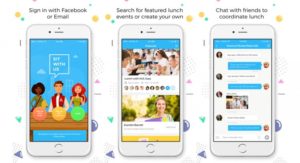
Sit With Us. An app that helps Gen Z promote kindness. Credit: https://itunes.apple.com/au/app/sit-with-us/id1133202101?mt=8
Sit With Us is a revolutionary app that aims to change this. A 16 year old girl who ate lunch alone for the entirety of her 7th grade wants to prove that tech can positively change the way we socialise. The app promotes positivity by giving Gen Z the chance to reach out to those who may be feeling bullied or rejected, and inviting them to sit with them at lunch times. Many young people think that 13 is an appropriate age to get their first smartphone. This app can help combat youth that feel as if they’re lost, have a lack of social connections in their school environment, promoting kindness along the way.
2. TBH
Long gone are the days of communicating with the people who are within close proximity to us. Or the long distance call charges. With the coming of the smartphone and mobile platforms that followed, ubiquity is at its peak. It’s now easier than ever to talk with friends, family, and even strangers anywhere and at anytime you please. Granted, communication being globalised is positive. However, this isn’t always used for constructive communication.
Many social and messaging apps have an element of anonymity, providing a platform to say whatever you want to anyone. This sadly ends up being used for malicious reasons, harming the receiver with racist, negative comments, and threats. Anonymous social apps such as Yik Yak aid the cyberbullying trend, as users can hide behind their unknown identity. In fact, according to statistics from the National Crime Prevention Council 43% of adolescents were bullied online in 2014.
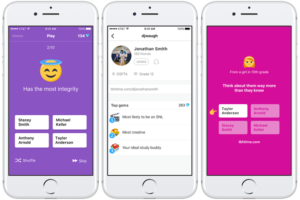
TBH has different goals for anonymity in apps. The app helps keep online communication positive for Gen Z. Credit: https://itunes.apple.com/us/app/tbh/id1200014540?mt=8
There is great opportunity for a mobile platform to provide a positive communication experience. TBH does just that, by twisting the use of anonymity for the better. TBH (to be honest) creates a positive environment for young people 13+ to send positive and uplifting compliments to their class mates. The app has reached the top of the App Store’s free charts, which is no surprise as there’s a desperate need for positive online reinforcement in a world full of anonymous haters.
3. MindShift
You’d think with access to so many communication platforms there would be an increase in socialising outside of the online sphere. These pieces of technology actually seem to have done the opposite by creating isolation, rather than combatting it. Not to mention, apps such as Snapchat and Instagram allow users to see when their friends are doing things without them. Providing a platform for you to constantly compare your life with those around you.
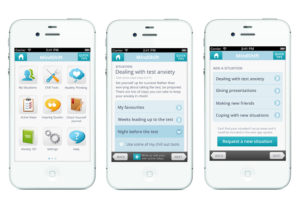
Mindshift is an app that aims to help not only Gen Z, but anyone suffering with anxiety. Credit: https://itunes.apple.com/au/app/mindshift/id634684825?mt=8
With a childhood full of constant communication and the need for online validation, it’s easy to lose track of keeping your headspace happy and healthy. 42% of Gen Z say that social media has a direct impact on how they feel about themselves. Anxiety has seen a detrimental increase in millennialls and Get Z’ers for these exact reasons. So how do we combat this? Apps like Whisper allow people to freely, and anonymously, let go of whats on their mind and gain the support of strangers. However, we’ve seen that this element of anonymity isn’t always used positively.
MindShift is a useful tool that provides young teens the help to manage their anxiety. Many young people are embarrassed to seek help from friends or family. Mindshift helps coach its users to relax and take charge of their feelings by providing a better way of thinking. By changing the way they think, it aims to allow its users to combat their anxiety rather than avoid it.
4. OurPact
As we’ve already said, the smartphone we know and love today gives its users access to almost anything. The beauty of ubiquity is exactly that, its everywhereness. Within a few clicks or swipes of a webpage or mobile app, you can be viewing, talking to, or purchasing whatever your heart desires. All without a parents approval. With Gen Z enabled to a life full of constant screen time and real time communication, it’s no wonder parents can’t keep up!
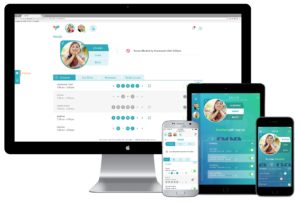
OurPact allows Gen Z’s online habits to be monitored by their parents, to keep their online behaviour positive. Credit: https://itunes.apple.com/au/app/ourpact-parental-control-screen-time-manager/id954029412?mt=8
Many parents are continuously out of the loop when it comes to their child’s online activity. This is surprising considering the exact nature of social networks are to keep friends and family, in the loop! In fact, tech.co found that 14% of phone users under the age of 15 use their mobile devices for more than 12 hours a day. With an extra 13% stating they’re constantly checking their phone for updates, messages, and snapchats every few seconds.
OurPact places the control back in the hands of the parent. The app allows you to manage your families screen-time, block specific apps and even see which apps are being used on your child’s device! This gives parents peace of mind, knowing their children are using internet tools positively while also promoting healthy usage habits. It also ensures they’re maintaining a healthy sleep cycle, which is crucial to a healthy and happy headspace.
5. Pozify
Research shows that 55% of young people like to share their opinion with others. The way they share this news however, has changed. Gen Z is a generation of visual communicators. This means that rather than talking in person, they prefer to share news and opinions online through media outlets. This opinion and the shared digital content associated with it, is not always appropriate nor positive for an online space.
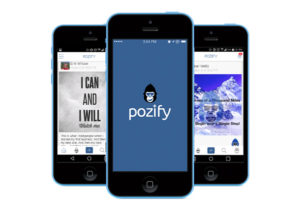
Pozify aims to promote the creation of positive content online. Credit: https://play.google.com/store/apps/details?id=com.positive.pozify&hl=en
Pozify combats this issue by providing a platform to spread and promote positivity. It rewards its users for spreading positive stories across their network. Their goal? Encourage the creation and sharing of valuable and positive content. Their rewards? mPoints that users can redeem to buy gift cards and products from major retailers. Following the theme of positivity, you can even use the points to donate to charity!

